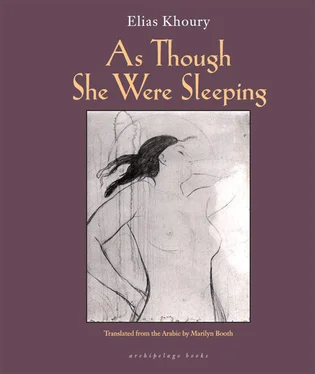Body in one land, soul in another
the loneliness of the spirit, the exile of the flesh
Poetry is a dream. I can’t imagine a poet except as someone who has a dream and then writes it.
Poetry, she said to him, drops onto poets like revelation because it comes from the same place as dreams. Think about the lives of the prophets and the saints, she said. God addresses Himself to people through dreams. That’s how He spoke to Yusuf the Carpenter. He said, Your wife is pregnant. The man was asleep at the time.
But no one came and talked to me like this. You just told me you were pregnant and that was that.
But it was in my dream that I saw I was pregnant — Milia did not finish her sentence. She was afraid that Mansour would believe she was mad. How could she tell him the dream of the child? Even more, how could she say to him that she was absolutely certain that the birth of her child would not occur in Nazareth. No, her husband would be compelled somehow to take her to Bethlehem, exactly as Yusuf had taken his wife.
That night she halted her dream halfway through. Mansour was standing in the kitchen, looking out the window. She saw him from the back and what struck her — and worried her — was his baldness. Mansour’s hair had been very thick. There was no history of baldness in his family, he had told her. But now he looked exactly like the driver on the road to Shtoura. In fact, for a startled moment she thought the person she was looking at was the driver. She found herself standing on tiptoes to have a fuller look at his baldness, asking herself in bewilderment what could have brought him here. But then she heard the man’s voice and it was Mansour’s. He told her that she had changed enormously too. It’s as though I don’t know you, he said. As if you veil your face. Why?
She said nothing. She felt a shiver of cold run through her and decided to stop this dream. What could the disappearance of her husband’s hair mean but death? Anyone who dreams baldness must beg God’s protection immediately, because it means death, Grandmama Malakeh had said.
The night Mitri died, her grandmama explained, I dreamed that whole locks of my hair fell out. I was standing in front of the mirror combing my hair and it started falling out, lock by lock, and suddenly I was bald. I screamed and that was the boy’s death scream.
She opened her eyes and noticed that she was uncovered. She pulled the wool blanket over her body, told the dream to stop, and went back to sleep. But she saw him again. He was in the same spot. His bald head was scaly with dandruff and she heard his voice. It’s as though I don’t know you, he said. She reopened her eyes. She knew she must not go back to sleep, for any dream that came to her three times in succession would become reality. She decided to get up and go into the kitchen to make a glass of hot yansun . Since childhood she had loved aniseed tea. Every Sunday her father would steep sweetened hot yansun and let it go cold. At noon when the family gathered around the table for kibbeh nayye he poured himself a glass of arak and, for his children, what he called children’s arak, bringing it to them in small glasses filled to the brim with the sweet yellow liquid. They knocked their yellow glasses against his white one, and all took a sip. Much later, when the children discovered that the taste of arak was indeed very like the taste of yansun , they began drinking arak made from grape alcohol and aniseed in memory of their father. For the first few days of her marriage Milia tried to have a glass of cold aniseed as her husband drank his arak, but he would not play along. Hey — I drink and you just watch me? No, that’s not the way we do it! He was not persuaded of the virtues of yansun until after Milia became pregnant and the Italian doctor made certain she knew that alcohol would harm the fetus. Milia went back to children’s arak.
That night she went into the kitchen to make hot yansun , which was the only drink guaranteed to revive her. Here in Palestine she had learned to drink black tea as if it were coffee. But she still thought of tea as a remedy for chest colds and fever.
How can anyone decide to drink tea instead of Arab coffee? mused Mansour. But that’s the way we are. Mansour launched into an explanation of why tea was so popular locally. It was a direct result of British imperialism, he said, and it was the beginning of the end, a sign of inevitable defeat. So we replaced our coffee with their tea! Did you know, Milia, that long ago the Arabs called their wine qahwa , as if it were coffee, and then when coffee actually reached them and the habit took root they called it khamr , as if it were a kind of alcohol, because it had narcotic effects so they saw it as another kind of spirit. Here, though, we started drinking tea and we grew accustomed to it — so much so that it’s seen as a national drink. What a big lie official histories are! Now, arak — did you know that arak is Turkish originally, and not Arab at all? You think that arak is our national drink, across this entire region of Syria and Palestine and Lebanon. We all think that, but no — it isn’t even Arab. In all the famous ancient Arabic poetry celebrating khamr there’s not a single hemistich about arak. Khamr means wine or alcohol, but we’re so provincial and narrow-minded that we have forgotten this and we talk about arak as if it were our invention.
Going into the kitchen, she did not put on the light because the night itself was bright. She put the little coffeepot on the flame and stood waiting but the water refused to heat up. Everything in the kitchen seemed out of the ordinary: the moonlight shooting through the window to encase the sink in its resplendent silver rays; the cicadas’ constant hass-hass-hass was almost deafening; the tracery of the tiles sparkling as if giving off their own light, and the yansun whose normal yellow had turned bluish. Milia was pressing her hands over her ears to block out the noise when she saw him, a sudden apparition that seemed to enter from nowhere. It was Mansour standing at the window turning his back to her.
I’m making a glass of yansun . Would you like one?
Suddenly she saw his baldness and her knees went weak.
And you’ve changed enormously too, said Mansour.
Milia screamed. In the name of the blessed cross! And saw that she was lying in bed wrapped up in the coverlet and there was no light anywhere.
Bells ringing. Where were the bells and why didn’t those people take the dead boy down from the bell rope?
Mitri picked her up and carried her inside his photograph as it hung on the wall. He was tall and dark-complexioned and muscular. That is how she had always imagined him. That was what he looked like in the dream of the bamboo cane and the labneh sandwich. But he was not like that at all.
Describing her son, to whom she had not given birth, Malakeh said he was thin and pale-skinned. His red tarbush tipped forward and he was never without his bamboo cane. But here he was large and dark, a brown abaya over his white robe, his right hand grasping the bamboo cane while his left hand encircled the young woman’s waist.
Put me down, leave me alone, please, please! Look, I’ll bring you arus el-labneh , I don’t want to go into the picture — one photograph is enough for me.
She screamed, NO! and opened her eyes. She recognized the hospital smell immediately and saw Mansour standing next to her, trying to keep hold of her hand.
You are sweating a lot, he said. Please, please, just calm down, everything is fine. He picked up a small towel and pressed it to her forehead and hands to soak up the beads of sweat.
Читать дальше












